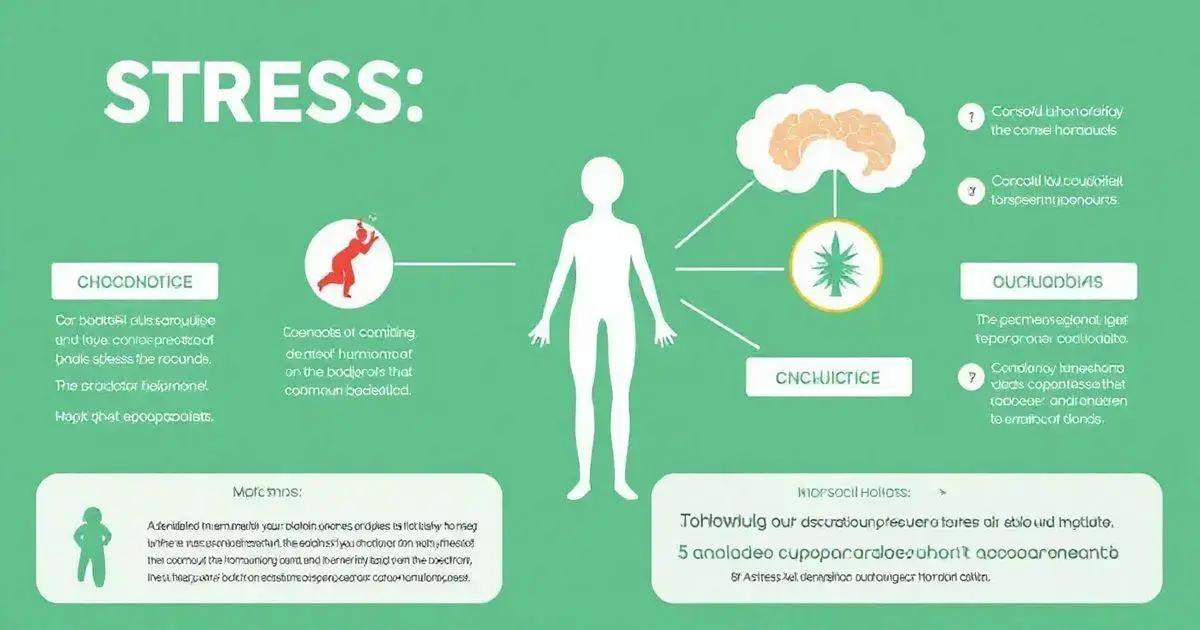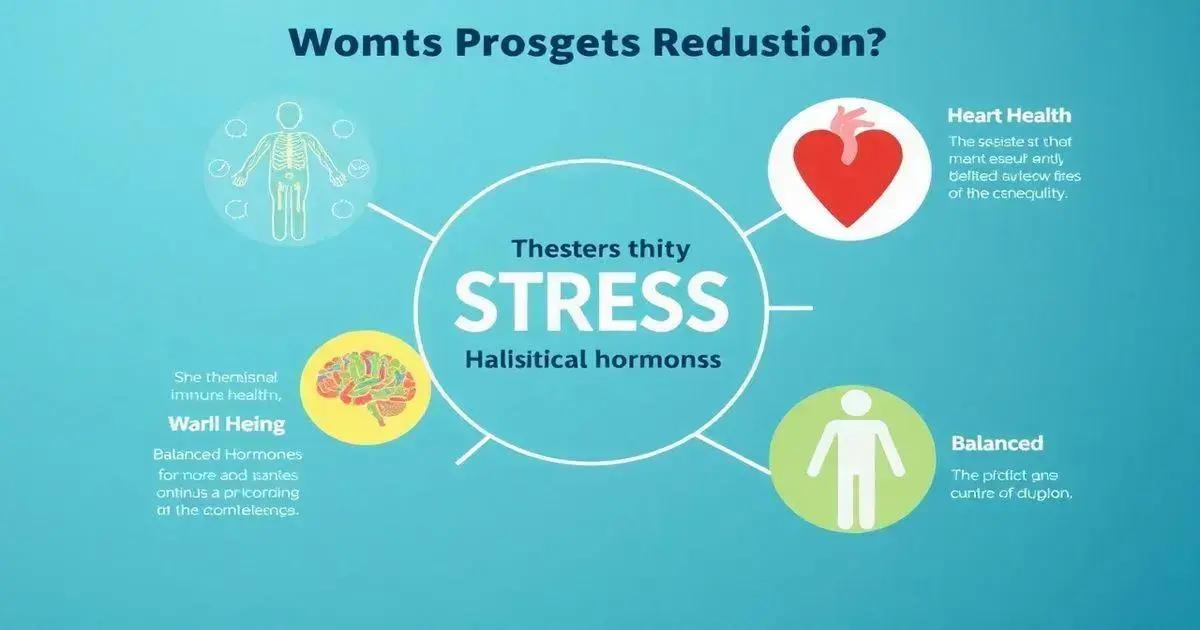The connection between stress reduction and healthy hormones is crucial for overall well-being; effective stress management techniques such as mindfulness, exercise, and healthy eating can lead to hormonal balance, improved mental health, enhanced immune function, and long-term health benefits.
Stress reduction plays a vital role in maintaining healthy hormones, which are essential for our bodily functions. When stress levels rise, various hormones such as cortisol can disrupt our hormonal balance, leading to numerous health issues. This article delves into the connection between stress reduction and healthy hormones, offering insights on effective techniques and lifestyle changes that promote hormonal harmony.
Understanding Stress and Its Impact on Hormones

Understanding stress is fundamental to recognizing its impact on our hormones. Stress triggers a response in the body known as the fight or flight response, which is primarily governed by the release of hormones, especially cortisol and adrenaline. These hormones prepare the body to act in response to perceived threats.
The Role of Cortisol
Cortisol is often called the “stress hormone” because it is released during stressful situations. While cortisol has important functions such as regulating metabolism and supporting immune response, chronic stress can lead to prolonged elevated cortisol levels. This can disrupt the balance of other hormones.
Impact on Other Hormones
Elevated cortisol can lead to decreased production of hormones like progesterone and testosterone, which are vital for various bodily functions. This imbalance can affect mood, libido, and overall health. For example, women may experience irregular menstrual cycles and mood swings, while men might suffer from decreased libido and energy levels.
Link to Mental Health
Additionally, stress can contribute to mental health issues such as anxiety and depression, further affecting hormone levels. The interplay between stress and hormones can create a cycle that perpetuates these conditions, highlighting the importance of managing stress.
Understanding these connections can help individuals take proactive steps to reduce stress and, in turn, support hormonal health. Recognizing stressors and responding appropriately is vital for maintaining a healthy hormone balance.
Techniques for Effective Stress Reduction

Implementing effective stress reduction techniques can significantly improve hormonal balance and overall well-being. Here are some practical strategies:
1. Mindfulness and Meditation
Mindfulness and meditation are powerful tools for reducing stress. Spending even a few minutes each day can help calm the mind and lower cortisol levels. Try focusing on your breath or using guided meditation apps.
2. Regular Physical Activity
Exercise plays a vital role in managing stress. Engaging in regular physical activity releases endorphins, which help improve mood and reduce anxiety. Aim for at least 30 minutes of moderate exercise most days of the week.
3. Healthy Eating
Nutrition is closely linked to stress levels. A balanced diet rich in whole foods, such as fruits, vegetables, and lean proteins, can support hormonal health. Avoid excessive caffeine and sugar, which can elevate stress levels.
4. Adequate Sleep
Getting enough quality sleep is crucial for stress management and hormone balance. Establish a bedtime routine, avoid screens before bed, and create a relaxing sleep environment to improve sleep quality.
5. Social Connections
Strengthening social connections can help buffer against stress. Spending time with friends and family, or engaging in group activities can promote feelings of support and belonging.
By incorporating these techniques into your daily routine, you can effectively manage stress, leading to a healthier hormonal balance and improved well-being.
The Role of Lifestyle in Hormonal Balance

Lifestyle choices significantly impact hormonal balance and health. Understanding how daily habits influence hormones can help individuals maintain their well-being. Here are some key aspects:
1. Nutrition
A balanced diet rich in essential nutrients is crucial for hormonal health. Foods high in fiber, healthy fats, and protein help stabilize blood sugar levels and promote hormone regulation. Incorporate foods like avocados, nuts, fruits, and vegetables for optimal nutrition.
2. Physical Activity
Regular exercise not only helps reduce stress but also supports healthy hormones. Engaging in aerobic activities, strength training, or yoga can improve insulin sensitivity and balance hormones such as estrogen and testosterone.
3. Sleep Quality
Quality sleep is vital for maintaining hormonal balance. Hormones like cortisol and growth hormone are regulated during sleep. Aim for 7 to 9 hours of uninterrupted sleep each night to support your body’s hormonal systems.
4. Stress Management
Stress plays a major role in hormonal imbalance. Developing healthy coping mechanisms, such as mindfulness, meditation, or spending time in nature can help manage stress levels effectively.
5. Avoiding Toxins
Minimizing exposure to environmental toxins is also essential for hormonal balance. Chemicals in plastics and processed products can disrupt hormone function. Opt for natural products and make informed choices about what you consume.
By making conscious lifestyle choices, individuals can actively support their hormonal health and overall well-being.
Connecting Stress Reduction to Long-term Health Benefits

Reducing stress has profound long-term health benefits that extend beyond mere relief from daily pressures. Here are some key connections between stress reduction and improved health outcomes:
1. Enhanced Immune Function
Chronic stress can weaken the immune system, making the body more susceptible to illnesses. By managing stress effectively, individuals can boost their immune responses, leading to better health and resilience against infections.
2. Improved Mental Health
Stress reduction techniques promote mental well-being by lowering anxiety and depression levels. Practices such as mindfulness and meditation not only enhance mood but also foster positive mental health over time.
3. Better Heart Health
High stress levels are linked to heart disease, hypertension, and other cardiovascular problems. Engaging in stress-reducing activities, such as regular exercise and relaxation techniques, can lower blood pressure and improve heart health.
4. Balanced Hormones
Chronic stress leads to hormonal imbalances, particularly in cortisol and adrenaline. By reducing stress, individuals can support hormonal balance, which is essential for overall health, energy levels, and mood stability.
5. Healthier Lifestyle Choices
Reducing stress often encourages healthier lifestyle habits. When stress is managed, people are more likely to engage in physical activity, eat nutritious foods, and maintain better sleep patterns, all of which contribute to long-term health.
Incorporating stress reduction techniques into daily life not only alleviates immediate feelings of stress but also lays the groundwork for a healthier future.
Connecting Stress Reduction to a Healthier Future
Understanding the connection between stress reduction and healthy hormones is essential for overall well-being. By incorporating effective techniques for stress management, individuals can foster hormonal balance and improve their physical and mental health.
From enhanced immune function to better heart health and mental clarity, the long-term benefits of stress reduction are profound. Making conscious lifestyle choices that promote stress relief not only helps in the short term but also sets the stage for a healthier, more vibrant future.
Ultimately, prioritizing stress reduction can lead to a more fulfilling life, increased productivity, and a stronger foundation for overall health.
FAQ – Frequently Asked Questions about Stress Reduction and Hormonal Health
What is the connection between stress reduction and hormone health?
Stress reduction helps maintain hormonal balance by lowering cortisol levels, which can otherwise disrupt various hormones in the body.
What are some effective techniques for reducing stress?
Effective techniques include mindfulness, regular exercise, healthy eating, quality sleep, and nurturing social connections.
How does lifestyle impact hormonal balance?
Lifestyle choices such as diet, physical activity, sleep quality, and stress management play a crucial role in maintaining hormonal balance.
Can reducing stress improve overall health?
Yes, reducing stress has long-term health benefits, including improved immune function, better heart health, and enhanced mental well-being.
How quickly can I see results from stress reduction techniques?
While some benefits may be felt almost immediately, long-term improvements in hormonal balance and health usually take consistent practice over weeks or months.
Is it necessary to see a professional for stress management?
While many techniques can be practiced independently, consulting a professional can provide personalized strategies and support for effective stress management.













